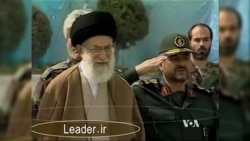Iran’s Supreme Leader Ayatollah Ali Khamenei is likely to have the final say on whether or not the country accepts a nuclear deal, if one is reached by month's end, Middle East analysts say.
As negotiations continue into the weekend between Iran and world powers, analysts say Khamenei, 75, is the most powerful political authority in the Islamic Republic because he controls the main levers of power. He commands the armed forces and the judicial system, along with state radio and television. Additionally, Khamenei also leads Iran’s foreign policy.
Patrick Clawson, the Director of Research at the Washington Institute for Near East Policy, told VOA the supreme leader “is the single most important person in the Islamic Republic of Iran, and the one who has the ultimate say about the nuclear talks.”
So far Khamenei has shown support for Iran’s negotiators. In February Khamenei told a group of Iranian Air Force officials, “I support the progress of this work [nuclear negotiations] and if a good deal is reached, I would agree with that and believe the Iranian nation would not oppose an agreement in which its dignity, respect and interests are protected.”
“Americans have repeatedly said they believe no deal is better than a bad deal,” said Khamenei. “Yes, we believe in that, too. We think that no deal is better than a bad deal that is against our national interests and humiliates the great nation of Iran."
Sanctions impact
Analysts say the majority of the Iranian public supports a nuclear deal, because sanctions are crippling the economy.
While shopping in a Tehran market, Tahereh Sadeghi said "a few years ago and before the sanctions, the situation was much better. Now the price of everything has almost doubled or tripled."
Analysts say the faltering economy is putting pressure on Khamenei to approve a nuclear deal.
Ali Alfoneh, an Iran scholar and senior fellow at the Foundation for Defense of Democracies, told VOA, “Mr. Khamenei is listening to those technocratic elites within the elite structure of Iran who tell him that Iran is on the verge of bankruptcy and is in need of cash, in need of sanctions relief, and this is exactly the type of sanctions relief that he will be getting as part of a nuclear bargain with the United States."
Experts say Khamenei came into office as supreme leader in a weak position and spent many years cultivating close relationships with the Revolutionary Guards.
Old ties
The Guards were formed after the 1979 Iranian revolution to protect the country’s Islamic system.
Clawson said Khamenei “is really now more a leader of the Revolutionary Guards than he is a prominent cleric. It is the Revolutionary Guards which are his natural power base and not the clerics,” he said.
Analysts say members of the Revolutionary Guards are aggressively pushing for nuclear weapons, although Iran's government insists its nuclear program is for peaceful purposes.
Khamenei has said Iran needs to show “heroic flexibility.”
Alfoneh said of Khamenei “he is the one trying to reach consensus for the nuclear program and he also has the final say if the U.S. and the Islamic Republic of Iran are going to reach an agreement or not.”
Transition questions
There has been rampant speculation about Khamenei’s health. Last September state media showed rare pictures of the ayatollah in the hospital after prostate surgery.
Analyst Clawson said “it is quite possible that in fact Khamenei’s medical condition is much worse than what they announced when he went into the hospital. And that they were preparing people for his death. But that is just speculation. We don’t know that,” he said.
Recently Iran’s Assembly of Experts, the clerical group in charge of selecting and supervising the supreme leader, elected a new chairman. The council chose Mohammad Yazdi, an 83-year-old conservative hardliner, over former President Akbar Hashemi Rafsanjani.
Khamenei has no designated successor and analysts expect a fight for power before one is chosen.
“We already see a struggle for power in Iran between two main camps,” said Alfoneh.
“One of them being the technocratic camp led by Mr. Rafsanjani and his supporters, but also the other camp led by the Revolutionary Guards and their civilian supporters within the clergy,” he said.















